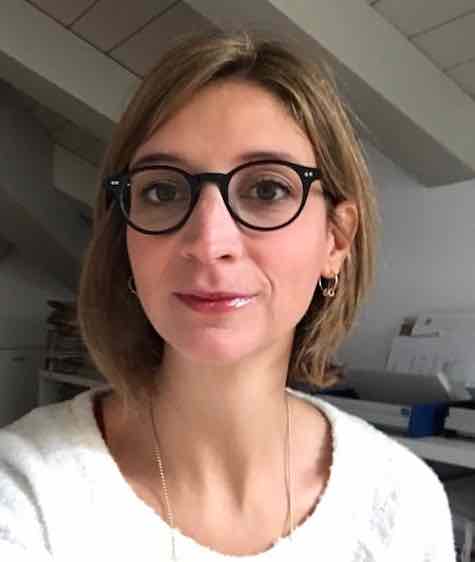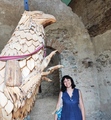Studying at the University of Verona
Here you can find information on the organisational aspects of the Programme, lecture timetables, learning activities and useful contact details for your time at the University, from enrolment to graduation.
Academic calendar
The academic calendar shows the deadlines and scheduled events that are relevant to students, teaching and technical-administrative staff of the University. Public holidays and University closures are also indicated. The academic year normally begins on 1 October each year and ends on 30 September of the following year.
Course calendar
The Academic Calendar sets out the degree programme lecture and exam timetables, as well as the relevant university closure dates..
| Period | From | To |
|---|---|---|
| I SEMESTRE | Oct 3, 2016 | Jan 21, 2017 |
| II SEMESTRE | Feb 27, 2017 | Jun 10, 2017 |
| Session | From | To |
|---|---|---|
| Lingue - SESSIONE INVERNALE | Jan 23, 2017 | Feb 25, 2017 |
| Lingue - SESSIONE ESTIVA | Jun 12, 2017 | Jul 29, 2017 |
| Lingue - SESSIONE AUTUNNALE | Aug 21, 2017 | Sep 23, 2017 |
| Session | From | To |
|---|---|---|
| Lingue - Sessione di laurea invernale | Apr 3, 2017 | Apr 8, 2017 |
| Lingue - Sessione di laurea estiva | Jul 10, 2017 | Jul 15, 2017 |
| Lingue - Sessione di laurea autunnale | Dec 18, 2017 | Dec 21, 2017 |
| Lingue - sessione di laurea invernale | Mar 23, 2018 | Mar 29, 2018 |
| Period | From | To |
|---|---|---|
| FESTA DI OGNISSANTI | Nov 1, 2016 | Nov 1, 2016 |
| FESTA DELL'IMMACOLATA CONCEZIONE | Dec 8, 2016 | Dec 8, 2016 |
| Vacanze Natalizie | Dec 23, 2016 | Jan 7, 2017 |
| Vacanze Pasquali | Apr 14, 2017 | Apr 18, 2017 |
| Festa della Liberazione | Apr 25, 2017 | Apr 25, 2017 |
| Festa dei Lavoratori | May 1, 2017 | May 1, 2017 |
| FESTA DEL SANTO PATRONO SAN ZENO | May 21, 2017 | May 21, 2017 |
| Festa della Repubblica | Jun 2, 2017 | Jun 2, 2017 |
| Vacanze Estive | Aug 14, 2017 | Aug 19, 2017 |
| Description | Period | From | To |
|---|---|---|---|
| ANNUALE | ANNUALE | Oct 3, 2016 | Jun 10, 2017 |
Exam calendar
Exam dates and rounds are managed by the relevant Foreign Languages and Literatures Teaching and Student Services Unit.
To view all the exam sessions available, please use the Exam dashboard on ESSE3.
If you forgot your login details or have problems logging in, please contact the relevant IT HelpDesk, or check the login details recovery web page.
Should you have any doubts or questions, please check the Enrollment FAQs
Academic staff
 valentina.adami@univr.it
valentina.adami@univr.it
 paola.bellomi@univr.it
paola.bellomi@univr.it
 daniele.beltrame@univr.it
daniele.beltrame@univr.it
 paolamaria.caleffi@univr.it
paolamaria.caleffi@univr.it
 riccardo.cella@univr.it
riccardo.cella@univr.it
 elisa.dallarosa@univr.it
elisa.dallarosa@univr.it
 sara.dattoma@univr.it
sara.dattoma@univr.it
 mariangela.lando@univr.it - marilando771@gmail.com
mariangela.lando@univr.it - marilando771@gmail.com
 stefania.montemezzo@univr.it
stefania.montemezzo@univr.it
 chunye.niu@univr.it
chunye.niu@univr.it
 alessia.polatti@univr.it
alessia.polatti@univr.it
 dora.renna@univr.it
dora.renna@univr.it
 fabioantonio.scrignoli@univr.it
fabioantonio.scrignoli@univr.it
 tania.triberio@univr.it
tania.triberio@univr.it
 sonia.trovato@univr.it
sonia.trovato@univr.it
Study Plan
The Study Plan includes all modules, teaching and learning activities that each student will need to undertake during their time at the University.
Please select your Study Plan based on your enrollment year.
1° Year
| Modules | Credits | TAF | SSD |
|---|
German literature and culture 1
German literature and culture 1
2° Year activated in the A.Y. 2017/2018
| Modules | Credits | TAF | SSD |
|---|
Italian literature and culture
Geography of communication and international trade
Modern and Contemporary Economic History
Theory and Techniques of communication
English literature and culture 2
German literature and culture 2
Spanish literature and culture 2
English literature and culture 2
German literature and culture 2
Spanish literature and culture 2
3° Year activated in the A.Y. 2018/2019
| Modules | Credits | TAF | SSD |
|---|
Comparative and European Public law
Principles of international marketing
| Modules | Credits | TAF | SSD |
|---|
German literature and culture 1
German literature and culture 1
| Modules | Credits | TAF | SSD |
|---|
Italian literature and culture
Geography of communication and international trade
Modern and Contemporary Economic History
Theory and Techniques of communication
English literature and culture 2
German literature and culture 2
Spanish literature and culture 2
English literature and culture 2
German literature and culture 2
Spanish literature and culture 2
| Modules | Credits | TAF | SSD |
|---|
Comparative and European Public law
Principles of international marketing
| Modules | Credits | TAF | SSD |
|---|
Legend | Type of training activity (TTA)
TAF (Type of Educational Activity) All courses and activities are classified into different types of educational activities, indicated by a letter.
German language 3 (2018/2019)
Teaching code
4S002924
Teacher
Coordinator
Credits
9
Language
German
Scientific Disciplinary Sector (SSD)
L-LIN/14 - LANGUAGE AND TRANSLATION - GERMAN
Period
II semestre dal Feb 18, 2019 al Jun 1, 2019.
Learning outcomes
On successful completion of this module, students should be able to:
- apply the basic descriptive categories of phonology to the phonological system of German;
- recognize the most important phonological processes of German;
- describe the most important differences between the phonological systems of German and Italian;
- carry out a phonetic transcription of Standard German words;
- demonstrate to have the German language skills that correspond to the C1 level of the CEFR.
--
Nach erfolgreichem Abschluss des Seminars sollen die Studenten in der Lage sein:
- die grundlegenden Kategorien eines phonologischen Beschreibungsmodells auf das phonologische System des Deutschen anzuwenden;
- die wichtigsten phonologischen Prozesse des Deutschen zu erkennen;
- die wichtigsten Unterschiede zwischen dem phonologischen System des Deutschen und des Italienischen zu beschreiben;
- eine phonetische Transkription standarddeutscher Wörter anzufertigen;
- Deutsch-Sprachkompetenz auf C1-Niveau (GeRS) nachzuweisen.
Program
Introduction to phonetics and phonology of German
This course introduces the basic concepts of articulatory phonetics and phonology which will then be used to investigate the phonological system of German. Topics of discussion include the German vowel and consonant system, the major phonological processes active in German (final devoicing, r-vocalization, aspiration etc.) and the German syllable structure. The phonological structures of German will systematically be compared with the equivalent structures of Italian.
This course is taught in German.
Text books
- Alber, Birgit (2007): Einführung in die Phonologie des Deutschen. Verona: QuiEdit.
- Hall, Tracy Alan (2000): Phonologie. Eine Einführung. Berlin/New York: de Gruyter [§ 1-2 (pp. 1-78), 4-4.2 and 4.8 (pp. 101-119, 130-133), 8-8.4.2 (pp. 205-227), 8.5-8.6.1.3 (pp. 230-247), 9-9.1 and 9.4 (pp. 271-275, 286-288)]. This text is recommended to students who cannot attend class regularly. Both books are available at the bookshop "QuiEdit" and in the university library.
Additional material will be available on the e-learning platform of the course.
The following books are for those students who have difficulties in reading the German texts:
- Nespor, Marina (1999): Fonologia. Bologna: Il Mulino.
- Graffi, Giorgio/Scalise, Sergio (2002): Le lingue e il linguaggio. Introduzione alla linguistica. Bologna: Il Mulino.
--
Einführung in die Phonetik und Phonologie des Deutschen
In dieser Lehrveranstaltung wird Grundwissen im Bereich der artikulatorischen Phonetik und der Phonologie vermittelt. Dieses Grundwissen wird dann dazu verwendet, um das phonologische System des Deutschen zu untersuchen. Dabei werden besonders folgende Bereiche berücksichtigt: das Vokal- und Konsonantensystem des Deutschen, die wichtigsten phonologischen Prozesse (Auslautverhärtung, r-Vokalisierung, Aspiration usw.) und die Silbenstruktur. Die verschiedenen phonologischen Strukturen des Deutschen werden jeweils mit denen des Italienischen verglichen.
Die Unterrichtssprache dieses Seminars ist Deutsch.
Bibliographie
- Alber, Birgit (2007): Einführung in die Phonologie des Deutschen. Verona: QuiEdit.
- Hall, Tracy Alan (2000): Phonologie. Eine Einführung. Berlin/New York: de Gruyter [Kap. 1-2 (S. 1-78), 4-4.2 und 4.8 (S. 101-119, 130-133), 8-8.4.2 (S. 205-227), 8.5-8.6.1.3 (S. 230-247), 9-9.1 und 9.4 (S. 271-275, 286-288)]. Die Lektüre dieses Buches wird besonders den studenti non frequentanti empfohlen.
Beide Bücher können in den Buchhandlungen "QuiEdit" erworben werden, sind aber auch in den Bibliotheken der Universität verfügbar.
Weitere Unterrichtsmaterialien werden auf der e-learning Plattform der Lehrveranstaltung zur Verfügung gestellt.
Folgende Texte sind zum Nachschlagen gedacht, falls es Probleme beim Lesen der deutschen Texte gibt:
- Nespor, Marina (1999): Fonologia. Bologna: Il Mulino.
- Graffi, Giorgio/Scalise, Sergio (2002): Le lingue e il linguaggio. Introduzione alla linguistica. Bologna: Il Mulino.
| Author | Title | Publishing house | Year | ISBN | Notes |
|---|---|---|---|---|---|
| Alber, Birgit | Einführung in die Phonologie des Deutschen | QuiEdit | 2007 | 9788889480250 |
Examination Methods
Final exams throughout the year are written. Students which attend classes regularly are offered the possibility to take a partial written exam during the course followed, after certification of the language skills, by another partial written exam on specific parts of the program. The exams consist of a theoretical part (questions regarding basic concepts) and a practical part which comprises phonetic transcription, determination of phonological processes and syllable structure analysis of German words, in contrast to Italian. The language of both exams is German.
Linguistic competence required: level C1 (CEFR), certified either by the CLA (Centro Linguistico di Ateneo) or by any other authorized testing center. The final grade will be calculated as the mean score of the grade of the exam and the grade obtained for the C1 certificate.
Students taking this exam must have completed the language and literature exams of the first and second year.
--
Für die Lehrveranstaltung ist eine schriftliche Prüfung vorgesehen. Den studenti frequentanti wird während des Seminars eine Teilprüfung angeboten, die zu den üblichen Prüfungsterminen durch eine weitere schriftliche Teilprüfung zu spezifischen Themen des Seminarprogramms ergänzt wird. Die Prüfungen bestehen aus einem theoretischen Teil (Fragen zu Grundbegriffen) und einem praktischen Teil, der phonetische Transkription, Bestimmung phonologischer Prozesse und Silbenstrukturanalysen deutscher Wörter umfasst, immer auch im Kontrast zum Italienischen. Die Prüfungen müssen in deutscher Sprache abgelegt werden.
Voraussetzung für die Prüfung ist die Sprachkompetenz C1 (GeRS). Die Sprachkompetenz kann durch die Zertifikate des CLA (Centro Linguistico di Ateneo) oder anderer anerkannter Institute nachgewiesen werden. Die Endnote des Kurses ist der Mittelwert aus der Note der hier beschriebenen Prüfung und der Note des C1-Zertifikats.
Es wird weiterhin darauf hingewiesen, dass nur diejenigen Studierenden zur Prüfung "Deutsche Sprache 3" zugelassen werden, die bereits die Sprach- und Literaturprüfungen des ersten und zweiten Jahres erfolgreich bestanden haben (s. Studienordnung).
Type D and Type F activities
To discover all the teaching activities accredited by the foreign teaching college click here
Career prospects
Module/Programme news
News for students
There you will find information, resources and services useful during your time at the University (Student’s exam record, your study plan on ESSE3, Distance Learning courses, university email account, office forms, administrative procedures, etc.). You can log into MyUnivr with your GIA login details: only in this way will you be able to receive notification of all the notices from your teachers and your secretariat via email and soon also via the Univr app.
Student login and resources
Gestione carriere
Assegnazione tutore
Attività accreditate D/F
Calendario didattico dettagliato
Cambio lingua curriculare
Competenze informatiche
Competenze linguistiche (prima e seconda lingua)
Competenze linguistiche in triennale (terza lingua CFU F)
Compilazione del piano didattico
Corso di Lingua portoghese
Erasmus+ e altre esperienze all'estero
Linguistic training CLA
Presentazione dei corsi di studio e Open day
Graduation
List of theses and work experience proposals
| Stage | Research area |
|---|---|
| PROGETTO MAMBRINO Stage per bibliografia | Various topics |
Saperi minimi
Stage e tirocini
Nel piano didattico della laurea triennale in Lingue per il turismo e il commercio internazionale (L12) è previsto un periodo di stage obbligatorio (CFU 6) in organizzazioni imprenditoriali.
Le attività di stage sono finalizzate a far acquisire allo studente una conoscenza diretta in settori di particolare interesse per l’inserimento nel mondo del lavoro e per l’acquisizione di abilità professionali specifiche.
Le attività di stage sono svolte sotto la diretta responsabilità di un singolo docente presso studi professionali, enti della pubblica amministrazione, aziende accreditate dall’Ateneo veronese.
I crediti maturati in seguito ad attività di stage saranno attribuiti secondo quanto disposto nel dettaglio dal “Regolamento d’Ateneo per il riconoscimento dei crediti maturati negli stage universitari” vigente.
- Tutte le informazioni in merito agli stage per futuri studenti sono disponibili alla pagina Stage e tirocini.
- Tutte le informazioni in merito agli stage per studenti iscritti sono pubblicate in MyUnivr - come fare per - stage e tirocini.
- Tutte le informazioni in merito agli stage per le aziende sono disponili alla pagina Stage e tirocini per azienze.
Ulteriori informazioni al seguente link https://www.univr.it/it/i-nostri-servizi/gestione-carriere-studenti-lingue-e-letterature-straniere/stage-e-tirocini-lingue-e-letterature-straniere


 +39 045802 8409
+39 045802 8409

























































